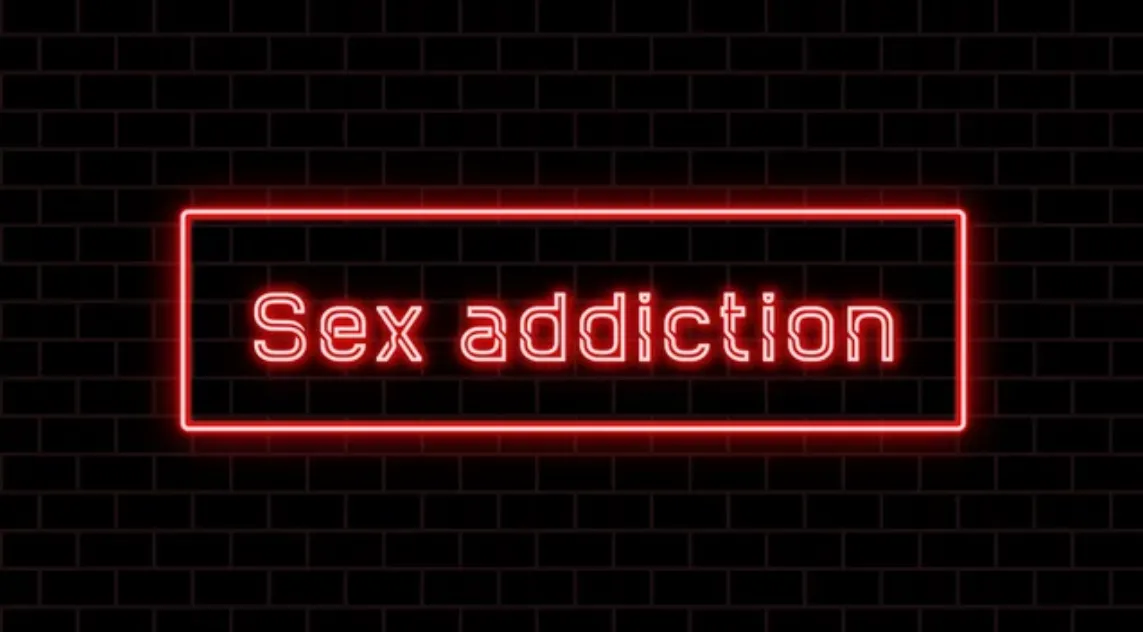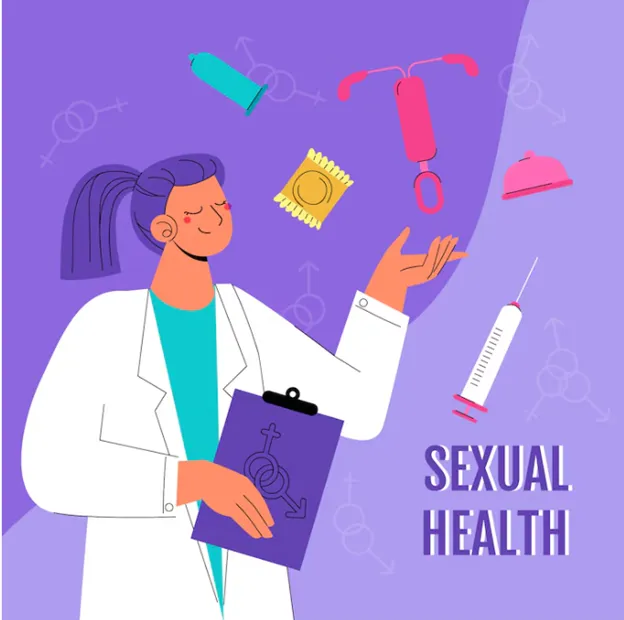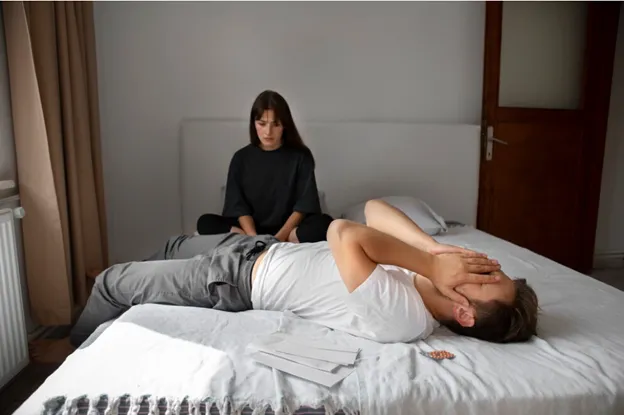Call Us On (877)-585-0677 To Speak To An Expert Today!
What is Sex Addiction and How To Treat
Overview of Sex Addiction
Sex addiction, also called hypersexual disorder or compulsive sexual behavior disorder, happens when someone can't stop thinking about or acting on sexual urges, even when it's hard to control. This can cause problems in their relationships, work, and mental health.
Unlike a normal interest in sex, sex addiction involves actions that can hurt themselves or others. Treating sex addiction is complicated, and not everyone agrees on how to handle it.
Even though many people are affected, it’s not officially recognized as a medical condition by major organizations like the American Psychiatric Association or the World Health Organization.
People dealing with sex addiction might do risky or inappropriate sexual things, feel a lot of guilt or shame, and struggle to stop, even though they know it's harmful.
Importance of Understanding Sex Addiction
Understanding sex addiction is crucial for several reasons:
Improving Quality of Life: By recognizing and treating sex addiction, individuals can regain control over their lives, reduce distress, and improve their overall well-being.
Enhancing Relationships: Sex Addiction Treatment can help restore trust and intimacy in personal relationships, which are often severely impacted by addictive behaviors.
Mental Health: Addressing sex addiction can alleviate co-occurring mental health issues such as depression, anxiety, and low self-esteem, which are commonly associated with the disorder.
Reducing Risky Behaviors: Effective treatment can help lower the chances of engaging in risky sexual behaviors that could lead to legal trouble, sexually transmitted infections, and other negative consequences.
Promoting Healthy Sexuality: Sex addiction treatment helps people build a healthier relationship with sex, seeing it as a normal and positive part of life instead of something driven by compulsion and guilt.
Recognizing the signs of sex addiction and getting the right help is an important step toward getting better and living a healthier, happier life. Taking care of your sexual health can really improve your mental, physical, and even spiritual well-being. With the support of professionals, people can work on beating their addiction and finding long-term balance and happiness.
What is Sex Addiction?
Definition and Explanation
Sex addiction, also called hypersexual disorder or compulsive sexual behavior, is when someone constantly thinks about or acts on sexual urges way too much.
This can mess up their everyday life. People with sex addiction often feel like they can't control their actions, even when they've tried to stop.
This can lead to engaging in activities detrimental to their personal and professional lives.
Sex addiction manifests in various ways, including compulsive masturbation, excessive consumption of pornography, engaging in risky sexual behaviors, or seeking out multiple sexual partners.
Sex addiction treatment as a treatment method is highly controversial. If you are seeking treatment for sex and porn addiction, it’s critical to work with a provider that has a deep understanding of the controversy, like Craig Perra, founder of The Mindful Habit System.

According to the Cleveland Clinic, “debate is ongoing if [sex addiction] can be classified as a mental health disorder. The American Psychiatric Association rejected a proposal to include [sex addiction] as a condition in DSM-5 (Diagnostic and Statistical Manual of Mental Disorders, fifth edition), their manual for assessing and diagnosing mental health conditions. Their reason was lack of evidence and the potential consequences of calling excessive sexual activity a “pathology” (calling it a disease or disorder).”
The American Association of Sexuality Educators, Counselors and Therapists (AASECT), the oldest and largest association of sex therapists has outright rejected the sex addiction treatment model, declaring that it “does not find sufficient empirical evidence to support the classification of sex addiction or porn addiction as a mental health disorder, and does not find the sexual addiction training and treatment methods … to be adequately informed by accurate human sexuality knowledge.”
Whatever you call it, the key aspect of sex addiction is that these behaviors become compulsive, causing distress or impairment in social, occupational, or other important areas of functioning.
Distinguishing Between Healthy Sexual Behavior and Addiction
Healthy Sexual Behavior:
Consensual and Mutually Enjoyable: Sexual activities should be consensual and enjoyable for everyone involved.
Balanced and Controlled: Sexual thoughts and activities are a normal part of life, but they shouldn't take over or get in the way of your daily responsibilities or obligations.
Emotionally Satisfying: Sexual behavior should be emotionally satisfying and have a positive impact on your overall well-being and the health of your relationships.
Contextual Appropriateness: Sexual activities should fit the situation, with a clear difference between what's appropriate in private and what's appropriate in public.
Sex Addiction:
Loss of Control: People may feel like they can't control their sexual urges and behaviors, even when they want to stop or cut back.
Compulsivity: Sexual activities can become compulsive and repetitive, often done in a specific, ritual-like way.
Negative Consequences: People may keep engaging in sexual behavior even when it leads to serious problems, like relationship issues, legal trouble, or health risks.
Secrecy and Guilt: People might act in secret to hide their sexual activities and often feel a lot of guilt or shame about it.
Interference with Life: Sexual thoughts, urges, or behaviors can get in the way of everyday life, messing with work, personal relationships, and social interactions.
Cause Of Sex Addiction

Psychological Factors
Trauma: Many people with sex addiction have gone through trauma, like sexual abuse or other types of abuse when they were kids. This trauma can make it hard for them to deal with their emotions and relationships, and they might turn to addictive behaviors to cope with the pain.
Emotional Dysregulation: When people can't handle negative emotions like stress, anxiety, or depression, they might turn to sexual behaviors as a way to temporarily feel better or escape from those feelings.
Attachment Issues: When someone develops an insecure attachment style in childhood, it can make it hard for them to build healthy relationships as an adult. This might cause them to rely on sex as a way to feel close to others, instead of forming real emotional connections.
Biological Factors
Neurochemical Imbalances: When certain brain chemicals, like dopamine and serotonin, which control feelings of reward and pleasure, are not at normal levels, it can lead to addictive behaviors, including sex addiction.
Genetic Predisposition: Having a family history of addiction, like drug or alcohol problems, can make it more likely for someone to develop compulsive sexual behaviors.
Hormonal Influences: When sex hormones like testosterone are at abnormal levels, it can affect a person's sexual desire and behavior.
Social and Environmental Influences
Cultural and Societal Norms: Being exposed to cultural or societal norms that make excessive sexual behavior seem normal or cool can play a role in the development of sex addiction
Peer Influence: Association with peers who engage in or encourage risky sexual behaviors can promote similar behaviors.
Availability of Sexual Content: Easy access to pornography and sexual content through the internet and media can foster compulsive sexual behaviors.
Co-occurring Disorders
Substance Use Disorders: Many individuals with sex addiction also struggle with substance abuse, using drugs or alcohol to enhance or cope with their sexual behaviors.
Mental Health Disorders: Conditions such as depression, anxiety, bipolar disorder, and obsessive-compulsive disorder (OCD) sometimes co-occur with sex addiction, complicating treatment and recovery.
IF YOU ANSWERED YES TO ANY OF THESE QUESTIONS,
THEN IT’S TIME FOR YOU TO TAKE ACTION.
If you answered yes to any of these questions,
then it’s time for you to take action.
Symptoms Of Sex Addiction
Behavioral Signs
Compulsive Sexual Acts: Engaging in sexual activities too often or in a repetitive, ritual-like way, usually without thinking about the consequences.
Risky Sexual Behavior: Engaging in unprotected sex, having multiple sexual partners, or participating in sexual activities in risky or inappropriate situations.
Excessive Use of Pornography: Spending an excessive amount of time watching or searching for pornographic content.
Neglecting Responsibilities: Allowing sexual behavior to interfere with work, school, or family obligations.
Lying: The sex addict often lies about his behavior to keep it secret.

Emotional and Psychological Symptoms
Guilt and Shame: Persistent feelings of guilt, shame, or regret about sexual behaviors.
Anxiety and Depression: Increased levels of anxiety or depression related to sexual behavior or the inability to control it.
Obsessive Thoughts: Constant preoccupation with sexual thoughts, fantasies, or urges that are intrusive and disruptive.
Impact on Relationships and Daily Life
Relationship Problems: Strain on relationships due to infidelity, secrecy, or neglect stemming from compulsive sexual behavior.
Social Isolation: Withdrawal from social activities and relationships in favor of engaging in sexual behavior.
Financial Issues: Spending excessive money on sex-related activities or services, leading to financial difficulties.
Diagnosing Sex Addiction

Criteria for Diagnosis
****There is no formal medical condition called sex addiction and there is no universally recognized criteria for diagnosing sex addiction. Here though, are some generally accepted criteria.
Behavioral Patterns: Persistent and escalating patterns of sexual behavior despite efforts to control it and despite negative consequences.
Functional Impairment: Significant impairment in social, occupational, or other important areas of functioning due to sexual behavior.
Distress and Preoccupation: Excessive time spent in sexual activities or preoccupation with sexual thoughts that cause distress.
Self-Assessment Tools
Questionnaires and Surveys: Various self-assessment tools and questionnaires, such as the Sexual Addiction Screening Test (SAST), can help individuals identify symptoms and severity of sex addiction. A criticism of these lengthy and often expensive tests is that the test is too focused on the behaviors, which are always the symptoms of deeper issues.
Behavior Tracking: Keeping a journal or log of sexual thoughts, urges, and behaviors can provide insight into patterns and triggers.
Simple questions: are you in control of your sexual behaviors and do you lie about them?
Therapist Assessment: A trained mental health professional, such as a psychologist or psychiatrist, can conduct a thorough evaluation using clinical interviews and standardized assessment tools.
Comprehensive Diagnosis: A professional diagnosis typically includes assessing co-occurring mental health disorders, understanding the individual's history, and evaluating the impact of sexual behavior on their life.
Diagnosing sex addiction is a critical step towards getting the appropriate help and support needed for recovery.
With a CSAT (Certified Sex Addiction Therapist), although we don’t typically recommend therapists with this designation. You can get a professional evaluation that ensures a thorough and accurate diagnosis, so you can finally get the personalized, effective treatment plan you deserve.
Sex Addiction Treatment Methods
Available Sex Addiction Treatments
Sex addiction, like other behavioral addictions, requires a multifaceted approach to treatment. Effective treatment typically involves a combination of therapy, support groups, and sometimes medication to address underlying issues.
Treatment of Sex Addiction aims to help individuals gain control over their behaviors, develop healthier coping mechanisms, and improve their overall quality of life.
Cognitive-Behavioral Therapy (CBT)
Focus: CBT helps individuals identify and change negative thought patterns and behaviors associated with their addiction.
Techniques: Techniques include cognitive restructuring, behavioral interventions, and developing coping skills.
Benefits: CBT has a strong evidence base for effectiveness in treating various addictions, including sex addiction.
Cons: It works slowly, lacks structure, is overly focused on problems instead of solutions, and it lackst community - critical for long-term support.
Comprehensive treatment programs like the Mindful Habit System provides: (1) world-class expertise from coaches and therapists who overcame sex addiction, (2) a structured evidence-based path, (3) powerful community and accountability; and (4) support for spouses; (5) long-term support; and (6) a 100% unconditional 30-day money back guarantee...
Psychodynamic Therapy
Focus: This approach explores underlying unconscious conflicts, past traumas, and emotional difficulties that contribute to addictive behaviors.
Techniques: Techniques involve exploring past experiences, understanding emotional responses, and working through unresolved issues.
Benefits: Helps individuals gain deeper self-awareness and insight into the root causes of their addiction.
Focus: Specifically addresses the impact of trauma on an individual’s behavior and mental health.
Techniques: Techniques include Eye Movement Desensitization and Reprocessing (EMDR), somatic experiencing, and trauma-focused CBT.
Benefits: Effective for individuals whose sex addiction is linked to past traumatic experiences, helping them process and heal from trauma.
Benefits of Group Support
Shared Experiences: Provides a sense of community and understanding, as individuals share similar struggles.
Support and Accountability: Group members offer mutual support and hold each other accountable for progress and setbacks.
Reduced Isolation: Helps reduce feelings of isolation and loneliness, which are common in addiction.

Types of Group Therapy
Psychoeducational Groups: Focus on educating members about sex addiction and strategies for managing it.
Process-Oriented Groups: Allow members to discuss their thoughts and feelings in a supportive environment.
Skill-Building Groups: Focus on developing coping skills, relationship skills, and other practical strategies for managing addiction.
Inpatient and Outpatient Programs
Inpatient Programs:
Structure: Provide a structured, immersive environment with 24-hour support.
Benefits: Ideal for individuals with severe addiction or those who need a break from their usual environment to focus on recovery.
Duration: Typically last from 30 to 90 days or more, depending on individual needs.
Outpatient Programs:
Structure: Allow individuals to live at home while attending treatment sessions regularly.
Benefits: Suitable for individuals with milder addiction or those who need to maintain work and family responsibilities.
Flexibility: Programs can be intensive, with several sessions per week, or less frequent, based on individual needs.
Sex addicts considering inpatient treatment should evaluate Craig Perra’s at-home intensive instead. It will likely cost less and you won’t have to disrupt your life for 30-90 days to go to 12-step meetings that you can do for free. If you are certain inpatient is right for you, we recommend our friend Dr. Robert Weiss at Seeking Integrity.
12-Step Programs
Structure and Benefits
Structure: Based on a structured program of recovery that includes 12 steps, sponsorship, and regular meetings.
Spiritual Component: Often includes a spiritual element, encouraging individuals to seek help from a higher power.
Peer Support: Provides a supportive network of peers who are also in recovery.How to Get Involved
Finding Meetings: Meetings are widely available and can be found through organizations like Sex Addicts Anonymous (SAA) or Sex and Love Addicts Anonymous (SLAA).
Sponsorship: Participants can find a sponsor, a more experienced member who provides guidance and support.
Commitment: Regular attendance and active participation in meetings are encouraged for the best outcomes.
Cons: overly focused on the problem; public meetings lack privacy; focused on not doing behavior vs healthy sexuality; and frequently attended by sex offenders that have very different psychological problems than the average sex addict.
Determining the Right Fit
Assessment: A thorough assessment by a mental health professional can help determine the appropriate level of care.
Personal Circumstances: Factors such as severity of addiction, presence of co-occurring disorders, childhood trauma, and personal responsibilities play a role in deciding sex addiction treatment.
Recovery Goals: Individuals should consider their recovery goals and which setting will best support achieving them.
Effective treatment for sex addiction involves addressing the psychological, biological, and social aspects of the condition.
By exploring various treatment options and tailoring them to individual needs, individuals can work towards overcoming their addiction and leading healthier, more fulfilling lives.
Traditional 12 Step Programs, The Disease Based Model Of Addiction, And Traditional Therapy Simply Did Not Work.
Our Treatment Approach
Personalized Treatment Plans
Tailored to Individual Needs: At Mindful Habit Recovery Each person’s journey through sex addiction is unique. Our treatment plans are customized to address each individual's specific circumstances, triggers, and needs.
Comprehensive Assessments: We conduct thorough assessments to understand the root causes of the addiction, co-occurring disorders, and personal goals.
Ongoing Adjustments: Sex Addiction Treatment plans are regularly reviewed and adjusted to ensure they remain effective and aligned with the individual’s progress and changing needs.
Community: The opposite of addiction isn’t sobriety, it’s connection and Mindful Habit Recovery’s community build over a decade is great at providing accountability and connection.
Support for spouse: Betrayal trauma is real and spouse support is included.
Evidence-Based Methods
Proven Therapies: Craig is formally trained in mindfulness and the Internal Family Systems Model - the future gold standard of psychotherapy and high performance. He and his team utilize tools from therapies with strong evidence of success, such as Cognitive-Behavioral Therapy (CBT), Acceptance & Commitment Therapy, Dialectic Behavior Therapy (DBT), trauma-focused therapy, and psychodynamic therapy. They leverage these disciplines by training clients in the Mindful Habit System. This is the behavior change modality created by Craig and his wife Michelle.
Integrated Approach: Our approach combines different therapeutic techniques in a very practical coaching style to address the multifaceted nature of sex addiction, including its psychological, biological, and social aspects. The Mindful Habit System is a practical step-by-step path to learning how to control yourself and live your best life.
Continuous Improvement: We stay updated with the latest research and advancements in addiction treatment to provide the most effective care.
Supportive and Experienced Staff
Expertise: Our team consists of coaches, licensed therapists, and counselors with extensive experience in treating sex addiction.
Compassionate Care: We prioritize creating a supportive and nonjudgmental environment where individuals feel safe sharing their experiences and challenges. Since our team has all experienced the horror of sex addiction, we create a nurturing, safe environment to help clients address the deeper issues quickly.
Ongoing Support: Besides the initial intensive we offer, we provide ongoing support and resources to help individuals maintain their recovery and lead fulfilling lives.
Success Stories and Testimonials
Real-Life Experiences of Sex Addiction Recovery
Personal Journeys: Hear from individuals who have successfully overcome sex addiction through our programs. Their stories provide insight into the challenges and strategies that helped them.
Progress and Achievements: Learn about the tangible improvements in their lives, such as restored relationships, enhanced mental health, and renewed sense of purpose. Read what over 450 clients said about their experience with Mindful Habit Recovery - over 400 five-star EXCELLENT verified testimonials.
Inspirational Stories from Former Patients
Empowerment and Hope: Our former patients share their inspirational stories of transformation, offering hope and encouragement to others struggling with sex addiction.
Community Support: Many of our success stories highlight the importance of community and peer support in their recovery journey.
frequently asked questions
DOES THIS PROGRAM REPLACE THERAPY?
For the overwhelming majority of clients who join this program, the answer is yes. The Mindful Habit® contains everything you need to break free from your compulsive behavior and create a great life. The program is intense and requires you to work so it’s best that you focus your efforts here. That being said, a few clients supplement their work with a local therapist and/or 12 Step Meetings and that’s totally fine. It’s up to you to do what works for you.
WHAT HAPPENS AFTER I SIGN UP?
For the overwhelming majority of clients who join this program, the answer is yes. The Mindful Habit® contains everything you need to break free from your compulsive behavior and create a great life. The program is intense and requires you to work so it’s best that you focus your efforts here. That being said, a few clients supplement their work with a local therapist and/or 12 Step Meetings and that’s totally fine. It’s up to you to do what works for you.
How long do I have access to the program for?
For the overwhelming majority of clients who join this program, the answer is yes. The Mindful Habit® contains everything you need to break free from your compulsive behavior and create a great life. The program is intense and requires you to work so it’s best that you focus your efforts here. That being said, a few clients supplement their work with a local therapist and/or 12 Step Meetings and that’s totally fine. It’s up to you to do what works for you.
HOW LONG DOES IT TAKE TO COMPLETE THE TRAINING?
Lorem ipsum dolor sit amet, consectetur adipisicing elit. Autem dolore, alias, numquam enim ab voluptate id quam harum ducimus cupiditate similique quisquam et deserunt, recusandae.
HOW DO I USE THE PRODUCT LONG TERM?
Lorem ipsum dolor sit amet, consectetur adipisicing elit. Autem dolore, alias, numquam enim ab voluptate id quam harum ducimus cupiditate similique quisquam et deserunt, recusandae.
DO YOU HAVE A MONEY BACK GUARANTEE?
Lorem ipsum dolor sit amet, consectetur adipisicing elit. Autem dolore, alias, numquam enim ab voluptate id quam harum ducimus cupiditate similique quisquam et deserunt, recusandae.
I’M NOT TOO TECH SAAVY, IS IT HARD TO UNDERSTAND THE SYSTEM AND HOW DO I ACCESS THE CALLS?
Lorem ipsum dolor sit amet, consectetur adipisicing elit. Autem dolore, alias, numquam enim ab voluptate id quam harum ducimus cupiditate similique quisquam et deserunt, recusandae.
frequently asked questions
What is the recovery rate for sex addicts?
Recovery rates for sex addiction vary widely depending on factors such as the individual's commitment to treatment, the type of treatment program, and the presence of a support network.
Some studies suggest that with comprehensive sex addiction treatment, including therapy and support groups, recovery rates can be significant, but long-term success requires ongoing management and support.
How many cycles does a sex addict have?
Sex addiction doesn't have a fixed number of cycles. The addiction often involves patterns of compulsive sexual behavior followed by periods of guilt, shame, and sometimes temporary abstinence, which can vary greatly among individuals.
Are sex addicts good lovers?
The ability to be a good lover is subjective and depends on many factors beyond sex addiction. While sex addicts may have a high level of sexual experience, their compulsive behaviors can often interfere with forming healthy, intimate relationships, which can impact their ability to be attentive and present partners.
What do sex addicts have in common?
Common traits among sex addicts may include compulsive sexual behavior, difficulty controlling sexual impulses, preoccupation with sexual thoughts or activities, using sex as a coping mechanism for stress or emotional pain, and often experiencing negative consequences in personal and professional areas of life due to their behavior.
Are sex addicts usually narcissists?
Not all sex addicts are narcissists. However, some sex addicts may exhibit narcissistic traits, such as a need for admiration, a lack of empathy, or a preoccupation with fantasies of unlimited success or power. It's important to note that sex addiction and narcissistic personality disorder are distinct conditions, though they can co-occur.
Can sex addiction be cured?
Sex addiction is often considered a chronic condition, meaning that while it can be managed effectively through treatment and support, it may not be entirely "cured" in the traditional sense. Successful management typically involves ongoing therapy, support groups, and sometimes medication to address underlying issues. Creating healthy sexuality is a life-long necessity, just like eating healthy and working out.
What role does family play in the sex recovery process?
Family can play a crucial role in the recovery process by providing emotional support, participating in family therapy sessions, setting healthy boundaries, and encouraging the individual to stay committed to their treatment plan. A supportive family environment can significantly enhance the chances of successful recovery.
Are there any support groups for families and partners of those with sex addiction?
Yes, there are support groups specifically for families and partners of those with sex addiction. We offer a powerful Betrayal Trauma treatment program for betrayed partners. We also recommend our friend Dr. Debi Silber, PhD, founder of the Betrayal Trauma Transformation Institute. Organizations like S-Anon and COSA provide support, education, and resources to help loved ones cope with the impact of sex addiction on their lives.
What is the cost of Sex Addiction treatment?
The cost of sex addiction treatment can vary widely depending on the type of treatment (inpatient vs. outpatient), the duration of the program, and the specific provider. Outpatient therapy sessions can range from $150 to $500 per hour, while inpatient programs can cost several thousand dollars per week. Insurance coverage may vary, so it's important to check with individual providers and insurance companies for specific costs and coverage options.
Craig Perra, former sex and drug addict himself, is world-renowned for transforming the lives of people struggling with sex & porn addiction.
With success stories and clients in over 28 countries and 6 continents, Craig has made his mark as the top coach for professionals, executives, personalities and men in need of fast results and changes for the sake of their sexuality and relationships.
Contact Us for Help
Initial Consultation: Schedule a confidential consultation to discuss your situation and explore treatment options.
Flexible Appointments: We offer flexible scheduling, including evening and weekend appointments, to accommodate your needs.
Online Booking: Use our online booking system to easily schedule a consultation at a convenient time.
Location and Contact Information
No Risk, Start Changing Your Life Now



Thank you for trusting me with your recovery. I look forward to honoring that trust with a powerful program that drives results. If you’re not on track to profoundly changing your life in 30 days, please ask me for your money back.
-CRAIG PERRA | Certified Professional Coach,
Founder, The Mindful Habit Method
Take Action Today. Book Your Call With Craig To Learn More About Our Coaching Program & Get Started On Your Journey To Overcoming Porn & Sex Addiction.
Enter your name, email and phone in the boxes below to get started and schedule your call...
Quick Links
Call Us To Schedule Your Appointment:
Copyright @ 2026. The Mindful Habit® System | All Rights Reserved



